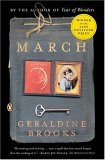Page 1 of 1
There are currently 3 reader reviews for March
Write your own review!
 Cathryn Conroy
An Original, Imaginative and Inspired Masterpiece (But Do Read
Cathryn Conroy
An Original, Imaginative and Inspired Masterpiece (But Do Read
This is a masterpiece—an original, imaginative, inspired masterpiece. That is the only way to describe this extraordinary Pulitzer Prize-winning book by Geraldine Brooks.
Published 137 years after Louisa May Alcott's "Little Women," this is the story of Mr. March, who was largely absent from Alcott's timeless classic as he was serving as a chaplain in the Civil War. The first part is written from Mr. March's point of view, while the second part is written initially from his wife's point of view when she is in Washington caring for her extremely ill husband and then switches back to him. (You will see a new and somewhat shocking side of Marmee!)
While Meg, Jo, Beth and Amy learn how to become kind, caring ladies while living in their small New England village—visiting the poor, mending their bonnets, taking walks, writing letters and playing small, harmless pranks on each other—their father is sent to Virginia to serve as a war chaplain where he witnesses horrific and gruesome brutality that will forever change who he is and how he views the world. This, along with some of his actions, will threaten his and Marmee's marriage in surprising ways no innocent reader of "Little Women" could imagine.
The contrast between the two books—"Little Women" and "March"—could not be more extreme. The one shows us sweet, genteel, mannerly girls who love greatly and seek to do good as they learn how to live moral, upright lives. The latter shows us the other side of life that is occurring at the exact same time but one that is brutal, dark, violent, cruel, vicious and evil.
And here is the sheer genius of "March": Brooks writes in the style and language of the 19th century, even though she is a 21st century author.
A Reading Recommendation: This is very much a companion book to "Little Women," albeit one that Louisa May Alcott never envisioned. I highly encourage you to read (or more likely reread) "Little Women" before reading "March." There are numerous nuances, details and references to the little women living in New England that will have far greater meaning for you as a reader of "March" if "Little Women" is fresh in your mind.
 Cloggie Downunder
an outstanding read
Cloggie Downunder
an outstanding read
March is the second novel by Australian author, Geraldine Brooks. It tells the story of Mr March, the absent father in Louisa May Alcott’s classic novel, Little Women. But as well as giving the reader an idea of his experience “at the war” (the noise, smell, blood, cold and death are almost palpable), Brooks provides background on the Civil War: attitudes to slavery in the north and south, behaviour of soldiers on both sides of the war, and the experience of the civilian population. She touches on the North’s mixed record of high idealism, negligence and outright cruelty regarding the contraband (slaves who came within Union lines) and vividly illustrates the moral dilemma faced in war by pacifists who were also ardent abolitionists. A multitude of facts is incorporated into the story in a way that renders them easily absorbed. By having March narrate the first two thirds of the book, Brooks also gives the reader some of Mr March’s history: his youth, his career, meeting Marmee, his involvement in the Abolitionist cause, the reason for his reduced circumstances. Marmee’s thoughts and feelings about her husband’s actions are detailed when she takes over the narration: this wise, dignified, compliant woman is shown to have unspoken opinions while remaining the strength of the March family. All this Brooks meshes seamlessly with the events in Little Women. While Alcott would have been able to write from personal experience, the vast amount of research that Brooks has had to do is evident on every page. March adds some darker adult resonances to the voids of Alcott’s sparkling children’s tale. An outstanding read.
Joan Clay Teague
March or Bronson Alcott
In many ways I consider this an excellent novel. I believe it grows less effective in Part 2 which is told from Marmee's point of view. I question whether the sex scenes with Grace were necessary or were added to enhance sales. Many will read this as an authentic account of Bronson Alcott's life in which there was no hint of scandal. One of the benefits of reading the book was that it led me back to reread "Little Women" and Henry David Thoreau's "Walden."
